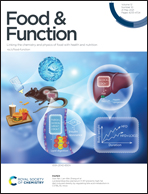Modulation of the fecal microbiome and metabolome by resistant dextrin ameliorates hepatic steatosis and mitochondrial abnormalities in mice†
Abstract
Targeting the gut-liver axis by manipulating the intestinal microbiome is a promising therapy for nonalcoholic fatty liver disease (NAFLD). This study modulated the intestinal microbiota to explore whether resistant dextrin, as a potential prebiotic, could ameliorate high-fat diet (HFD)–induced hepatic steatosis in C57BL/6J mice. After two months of feeding, significant hepatic steatosis with mitochondrial dysfunction was observed in the HFD-fed mice. However, the concentrations of triglycerides and malondialdehyde in liver tissue and the levels of alanine aminotransferase and aspartate aminotransferase in the serum of mice fed an HFD plus resistant dextrin diet (HFID) were significantly decreased compared to the HFD-fed mice. Additionally, hepatic mitochondrial integrity and reactive oxygen species accumulation were improved in HFID-fed mice, ameliorating hepatic steatosis. The fecal microbiome of HFD-fed mice was enriched in Bifidobacterium, Lactobacillus, and Globicatella, while resistant dextrin increased the abundance of Parabacteroides, Blautia, and Dubosiella. Major changes in fecal metabolites were confirmed for HFID-fed mice, including those related to entero-hepatic circulation (i.e., bile acids), tryptophan metabolism (e.g., indole derivatives), and lipid metabolism (e.g., lipoic acid), as well as increased antioxidants including isorhapontigenin. Furthermore, resistant dextrin decreased inflammatory cytokine levels and intestinal permeability and ameliorated intestinal damage. Together, these findings augmented current knowledge on prebiotic treatment for NAFLD.



 Please wait while we load your content...
Please wait while we load your content...